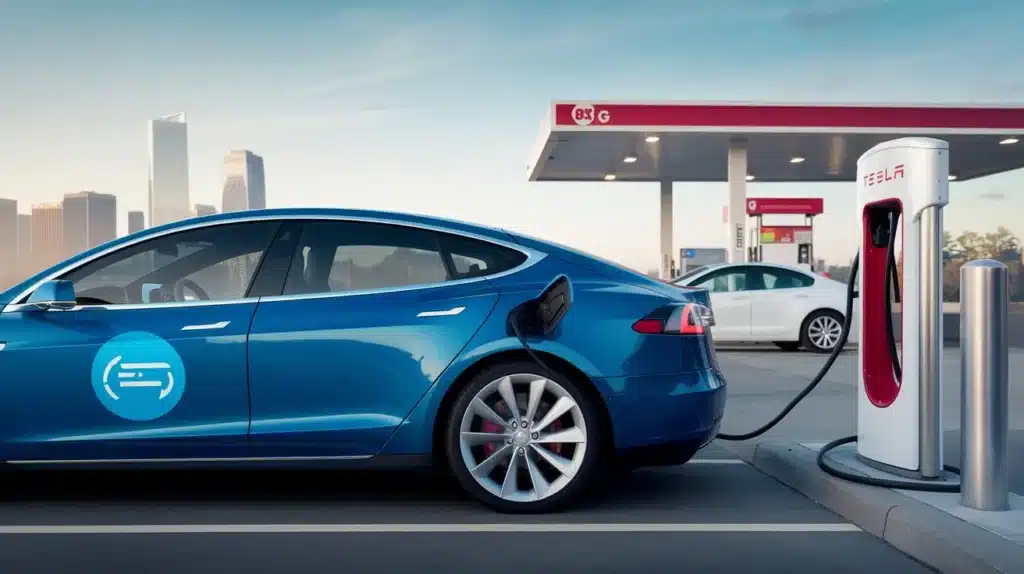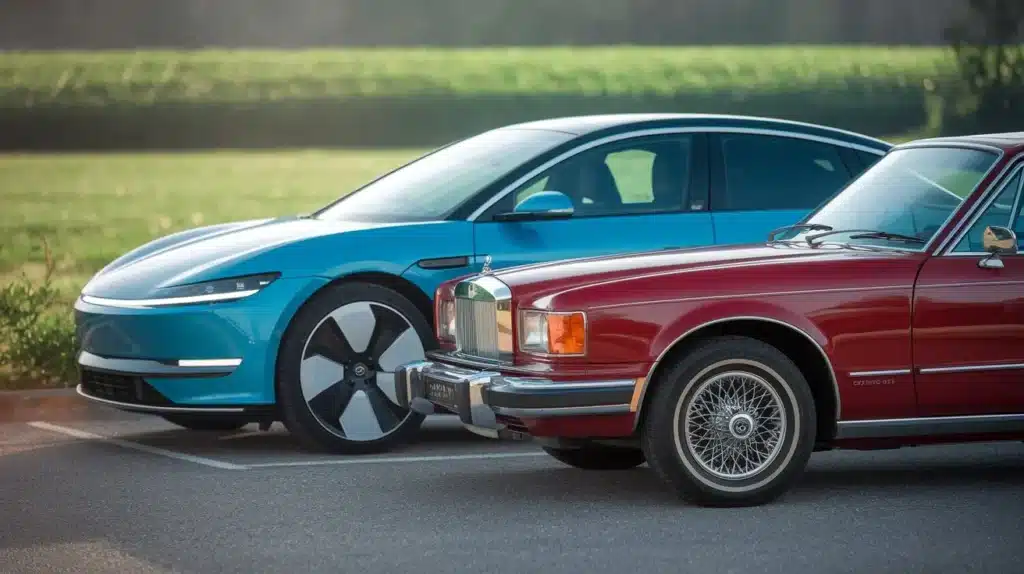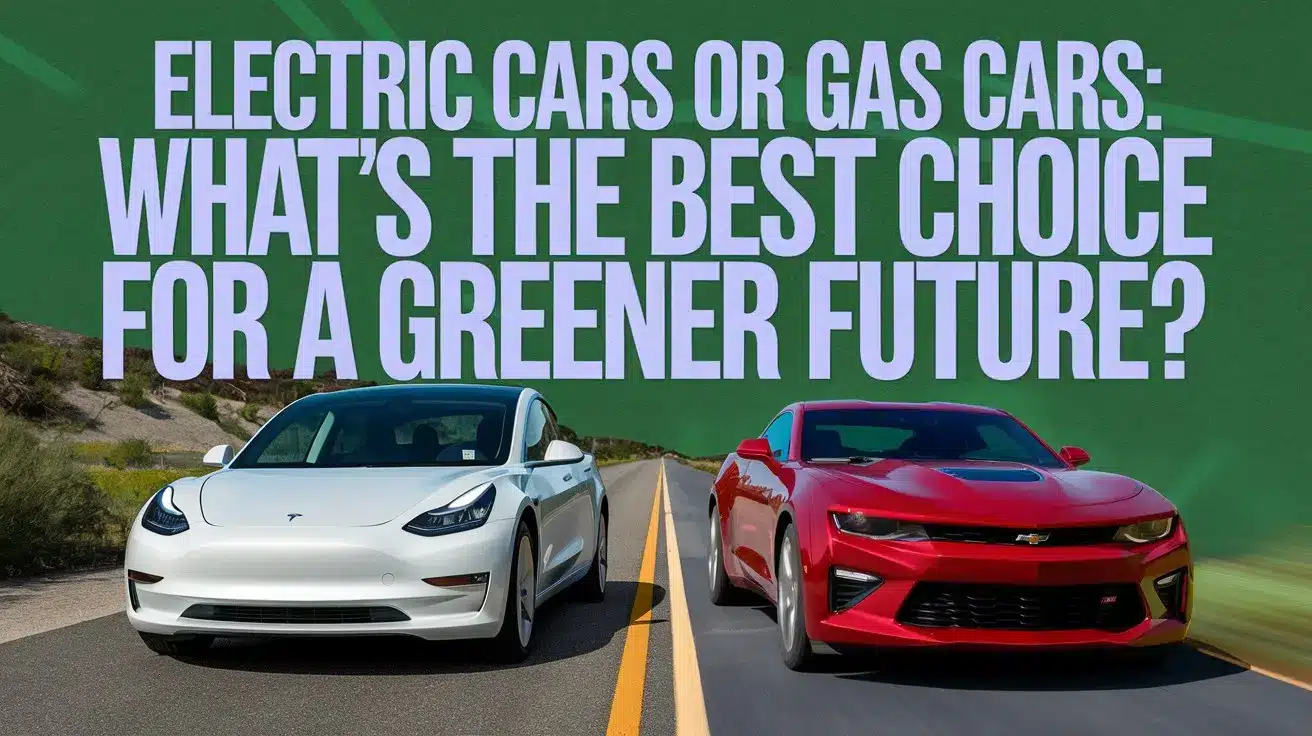Introduction
Electric Cars or Gas Cars: In an era where environmental consciousness meets technological innovation, the debate between electric cars and gas cars has never been more relevant. As we stand at a crucial crossroads in automotive history, choosing between electric cars or gas cars isn’t just about personal preference anymore—it’s about shaping our planet’s future.
Hey there! Thinking about buying a new car but feeling stuck between electric cars or gas cars? You’re not alone. Today, we’re going to dive deep into this hot topic that’s got everyone talking. With climate change on everyone’s mind and gas prices doing their roller coaster thing, choosing between electric cars or gas cars has become one of the biggest decisions for car buyers.
Historical Evolution : Electric Cars or Gas Cars
Remember when electric cars were just weird-looking vehicles that seemed like something from a sci-fi movie? Well, times have changed! Let’s take a quick trip down memory lane.
The Rise of Gas-Powered Vehicles
It all started with good old gas cars. For over 100 years, they’ve been our trusted companions on the road. The internal combustion engine has dominated our roads for over a century. From Henry Ford’s Model T to modern sports cars, gas vehicles have shaped our transportation culture and infrastructure. But here’s the thing – times are changing, and fast!
The Electric Revolution
Tesla’s groundbreaking entry into the market in 2008 marked a turning point in automotive history. Today, manufacturers from Chevrolet to BMW are investing heavily in electric technology.
Performance Comparison: Electric Cars or Gas Cars
| Feature | Electric Cars | Gas Cars |
|---|---|---|
| Acceleration | Instant torque | Gradual power build |
| Top Speed | 120-200 mph | 120-200+ mph |
| Range | 200-400 miles | 300-500 miles |
| Refueling Time | 30 mins – 8 hours | 5 minutes |
| Aspect | Electric Cars | Gas Cars |
|---|---|---|
| Power Boost Options | Software updates, battery upgrades | Engine tuning, turbocharging |
| Customization | Limited mechanical mods | Extensive modification options |
| Performance Parts | Growing aftermarket | Vast established market |
| Cost Factor | Electric Cars | Gas Cars |
|---|---|---|
| Initial Cost | $30,000 – $60,000+ | $20,000 – $45,000 |
| Monthly Fuel/Energy | $30 – $50 | $150 – $200 |
| Annual Maintenance | $300 – $400 | $600 – $1,200 |
| Insurance (Annual) | $1,500 – $2,000 | $1,000 – $1,500 |
Environmental Impact
Here’s where things get really interesting!
Electric Cars:
- Zero direct emissions
- Lower carbon footprint (especially with clean electricity)
- Reduced noise pollution
- Better for urban air quality
Gas Cars:
- Continued carbon emissions
- Dependence on fossil fuels
- Contributing to urban smog
- Engine noise in cities
Charging vs. Fueling Infrastructure
Current Status
The U.S. has over 150,000 public charging stations compared to 168,000 gas stations. Companies like ChargePoint and EVgo continue expanding the charging network.
Future Development
Major investments from governments and private sectors are accelerating charging infrastructure growth. The Biden administration has pledged $7.5 billion for EV charging networks.

Technology and Innovation
Electric Vehicle Advancements
- Solid-state batteries
- Faster charging capabilities
- Improved range technology
- Advanced driver assistance systems
Gas Vehicle Improvements
- Hybrid technology
- More efficient engines
- Cleaner fuel systems
- Alternative fuel compatibility
Market Trends and Future Projections
Infrastructure: The Big Picture
Let’s talk about the elephant in the room – infrastructure! of Electric Cars or Gas Cars :
Charging Networks:
- Growing rapidly
- More fast-charging stations
- Home charging options
- Workplace charging increasing
Gas Stations:
- Well-established network
- Quick refueling
- Easy to find
- 24/7 availability
By 2030, electric vehicles are expected to represent 45% of new car sales globally. Major manufacturers are committing to electric-only lineups:
- Volvo: 100% electric by 2030
- GM: 100% electric by 2035
- Ford: 40% electric by 2030
Practical Considerations
Daily Usage
- Commuting
- Long-distance travel
- Climate considerations
- Living situation (home charging capability)
Lifestyle Compatibility
- Family size
- Driving habits
- Local weather conditions
- Available parking/charging
Expert Opinions on Electric Cars or Gas Cars
According to automotive expert Sandy Munro, “Electric vehicles represent the future of transportation, but the transition will take time and infrastructure development.”

What are common misconceptions about gas cars?
Many myths and misconceptions about gas cars have persisted over the years. Let’s debunk some of these common beliefs with factual information and expert insights.
1. Fuel Efficiency Myths
Misconception: Premium Gas Makes All Cars Run Better
The Truth:
- Only cars specifically designed for premium fuel benefit from it
- Using premium gas in a regular-gas engine wastes money
- Higher octane doesn’t mean “better” fuel for all vehicles
2. Maintenance Myths
Misconception: Oil Changes Needed Every 3,000 Miles
The Truth:
- Modern cars can go 7,500-10,000 miles between oil changes
- Check your owner’s manual for actual recommendations
- Synthetic oils last longer than conventional oils
3. Engine-Related Myths
Misconception: You Must Warm Up Your Engine Before Driving
The Truth:
- Modern engines need only 30 seconds of warm-up
- Extended idling wastes fuel and increases emissions
- Driving gently after starting is the best warm-up method
| Misconception | Reality |
|---|---|
| Bigger engines always mean more power | Modern smaller engines with turbocharging can produce more power efficiently |
| Manual transmissions always get better mileage | Modern automatics often match or exceed manual transmission efficiency |
| Gas cars are always cheaper than electric | Total cost of ownership often favors electric vehicles long-term |
4. Performance Myths
Misconception: Modifying the Exhaust Always Increases Performance
The Truth:
- Random exhaust modifications often reduce performance
- Professional tuning is required for real benefits
- Many modifications may violate emissions laws
5. Fuel System Myths
Misconception: Running on Empty Damages the Engine
The Truth:
- Modern fuel pumps are well-protected
- However, sediment at tank bottom can clog filters
- Regular low fuel operation isn’t harmful to engine
6. Environmental Impact Myths
Misconception: Newer Gas Cars Don’t Pollute Much
The Truth:
- All gas cars produce significant emissions
- Catalytic converters reduce but don’t eliminate pollution
- Even new gas cars contribute to urban air quality issues
7. Cost-Related Myths
Misconception: Gas Cars Are Always Cheaper to Maintain
The Truth:
- Modern gas cars have complex systems requiring specialized maintenance
- Parts and labor costs have increased significantly
- Regular maintenance schedule affects long-term costs
8. Safety Myths
Misconception: Heavier Gas Cars Are Always Safer
The Truth:
- Modern safety features matter more than weight
- Design and crumple zones are key factors
- Electronic safety systems play crucial role
What about maintenance costs for gas cars?
Understanding maintenance costs for gas cars is crucial for budget planning. Let’s break down what you can expect to spend and how to manage these expenses effectively.
Basic Maintenance Schedule and Costs
| Service Type | Frequency | Average Cost |
|---|---|---|
| Oil Change | Every 5,000-7,500 miles | $30-$75 |
| Tire Rotation | Every 5,000-8,000 miles | $20-$50 |
| Air Filter | Every 15,000-30,000 miles | $20-$40 |
| Brake Service | Every 30,000-50,000 miles | $150-$400 |
Major Maintenance Expenses
| Major Service | Typical Timeframe | Cost Range |
|---|---|---|
| Timing Belt | 60,000-100,000 miles | $500-$1,000 |
| Transmission Service | 30,000-60,000 miles | $80-$250 |
| Water Pump | 60,000-100,000 miles | $300-$750 |
Annual Maintenance Costs by Vehicle Age
New Cars (0-3 years)
- Average annual cost: $600-$1,000
- Mostly routine maintenance
- Covered under warranty
- Predictable expenses
Mid-Age Cars (4-7 years)
- Average annual cost: $1,000-$2,000
- Some parts start wearing out
- Higher repair frequency
- End of warranty coverage
Older Cars (8+ years)
- Average annual cost: $1,500-$3,000
- Major repairs more likely
- Higher parts replacement rate
- Increased labor costs
Cost-Saving Tips
Preventive Maintenance
Regular maintenance prevents costly repairs:
- Follow manufacturer’s schedule
- Address issues early
- Keep detailed records
- Use quality parts
DIY Opportunities
Save money with simple DIY tasks:
- Air filter replacement
- Wiper blade changes
- Basic fluid checks
- Tire pressure monitoring
Factors Affecting Maintenance Costs
Vehicle Make and Model
- Luxury brands cost more
- Domestic parts usually cheaper
- Some models have known issues
- Parts availability varies
Driving Conditions
- City vs. highway driving
- Climate impacts
- Terrain effects
- Driving style
Hidden Costs to Consider
Depreciation
- Average 15-25% per year
- Affects resale value
- Varies by brand
- Maintenance history impact
Insurance and Registration
- Annual premiums
- Registration fees
- Emissions testing
- Safety inspections
Mechanics suggest:
- Keep detailed service records
- Use manufacturer-recommended fluids
- Don’t skip scheduled maintenance
- Build an emergency repair fund
How often should they be serviced?
Regular servicing is crucial for your car’s longevity and performance. Let’s break down exactly when and what services your car needs.
Basic Service Schedule
| Service Type | Frequency | Importance Level |
|---|---|---|
| Basic Oil Change | Every 5,000-7,500 miles | Critical |
| Tire Rotation | Every 5,000-8,000 miles | Critical |
| Brake Inspection | Every 12,000 miles | Critical |
| Air Filter | Every 15,000-30,000 miles | Important |
Monthly Checks You Should Do
Essential Monthly Inspections:
- Tire pressure and condition
- Oil level
- Coolant level
- Windshield washer fluid
- Battery connections
Seasonal Service Requirements
Spring
- Air conditioning check
- Wiper blade inspection
- Alignment check
- Tire rotation
Summer
- Cooling system inspection
- Battery test
- Brake check
- Air filter check
Fall
- Heater/defroster check
- Tire tread depth
- Battery load test
- Antifreeze levels
Winter
- Battery strength check
- Tire pressure monitoring
- Brake system inspection
- Fluid levels check
Warning Signs That Service Is Needed
Immediate Attention Required:
- Check engine light on
- Unusual noises
- Vibrations
- Reduced performance
- Strange smells
Service Based on Driving Conditions
City Driving
- More frequent oil changes
- Regular brake inspections
- Transmission checks
- Air filter replacement
Highway Driving
- Less frequent oil changes
- Tire rotation importance
- Wind shield maintenance
- Fuel system checks
Professional vs. DIY Service
DIY-Friendly Tasks:
- Oil changes
- Air filter replacement
- Wiper blade changes
- Tire pressure checks
Professional Service Required:
- Transmission work
- Engine diagnostics
- Timing belt replacement
- Brake system repairs
Cost-Saving Service Tips
1. Preventive Maintenance
- Follow service schedule
- Address issues early
- Keep records
- Use quality parts
2. Finding a Good Mechanic
- Read reviews
- Ask for recommendations
- Check certifications
- Compare prices
What future trends are emerging in gas technology?
While electric vehicles are gaining momentum, gas car technology continues to evolve. Let’s explore the latest innovations and future trends shaping traditional combustion engines.
Current Innovations Table
| Technology | Description | Impact |
|---|---|---|
| Mild Hybrid Systems | 48V electrical systems supporting engine efficiency | 10-15% fuel savings |
| Variable Compression | Adjustable compression ratios for better efficiency | 15-20% efficiency gain |
| Hydrogen ICE | Traditional engines modified for hydrogen fuel | Zero direct emissions |
Efficiency Improvements
| Technology Type | Current Status | Future Potential |
|---|---|---|
| Turbocharging | Widespread adoption | Electric turbo integration |
| Direct Injection | Standard technology | Dual injection systems |
| Cylinder Deactivation | Limited implementation | Dynamic deactivation |
Key Technology Developments
Advanced Materials
Emerging lightweight solutions:
- Carbon fiber components
- Advanced aluminum alloys
- Composite materials
- High-strength steel applications
Smart Engine Management
- AI-powered control systems
- Real-time optimization
- Predictive maintenance
- Connected car integration
Alternative Fuel Adaptations
Synthetic Fuels
Benefits include:
- Carbon-neutral potential
- Existing infrastructure use
- Drop-in replacement
- Reduced emissions
Hydrogen Combustion
- Modified traditional engines
- Zero direct emissions
- Infrastructure challenges
- Developing technology
Connected Car Features
Real-time Monitoring
- Engine performance tracking
- Maintenance predictions
- Fuel efficiency optimization
- Environmental impact analysis
Smart Integration
- Smartphone connectivity
- Over-the-air updates
- Diagnostic capabilities
- Performance optimization
Environmental Innovations
Emission Reduction
- Advanced catalytic converters
- Particulate filters
- NOx reduction systems
- Smart exhaust management
Sustainable Materials
- Recycled components
- Bio-based materials
- Sustainable manufacturing
- Circular economy focus
Market Impact and Adoption
Consumer Benefits
- Improved fuel economy
- Lower maintenance costs
- Better performance
- Extended vehicle life
Industry Changes
- Manufacturing adaptation
- Supply chain evolution
- Workforce training
- Infrastructure updates
Future Predictions
Short-term (2-5 years)
- Widespread mild hybridization
- Advanced turbocharging
- Connected car features
- Improved emissions control
Long-term (5-10 years)
- Synthetic fuel adoption
- Hydrogen engine options
- AI-driven optimization
- Revolutionary materials
Expert Insights
Industry specialists predict:
- Continued efficiency gains
- Hybrid technology growth
- Alternative fuel adoption
- Smart technology integration
How is renewable gas influencing these trends?
Renewable gas is reshaping the future of traditional combustion engines, offering a potential bridge between conventional gas vehicles and zero-emission transportation. Let’s explore how this emerging technology is influencing automotive trends.
Types of Renewable Gas
| Type | Source | Carbon Impact |
|---|---|---|
| Biogas | Organic waste, landfills | Carbon neutral |
| Synthetic Gas | Power-to-X technology | Carbon negative potential |
| Hydrogen Blend | Green hydrogen + natural gas | Reduced emissions |
Environmental Impact Comparison
| Fuel Type | CO2 Reduction | Implementation Cost |
|---|---|---|
| Traditional Gas | Baseline | Low |
| Renewable Gas | 60-80% | Medium |
| Synthetic E-Fuels | Up to 100% | High |
Current Market Developments
Production Scale
- Industrial biogas plants increasing
- Municipal waste conversion programs
- Agricultural waste utilization
- Carbon capture integration
Infrastructure Adaptation
- Existing pipeline modifications
- Filling station upgrades
- Storage facility development
- Distribution network expansion
Technology Integration
Engine Modifications
Required changes include:
- Fuel system adjustments
- Combustion optimization
- Sensor calibration
- Emission control updates
Smart Monitoring
- Real-time fuel quality analysis
- Performance optimization
- Emission tracking
- Efficiency monitoring
Economic Implications
Cost Factors
- Production infrastructure
- Distribution networks
- Vehicle modifications
- Maintenance requirements
Market Benefits
- Carbon credit opportunities
- Government incentives
- Reduced dependency on fossil fuels
- Local economic development
Industry Adoption
Current Implementation
- Fleet vehicles
- Public transportation
- Agricultural equipment
- Industrial machinery
Future Expansion
- Personal vehicles
- Commercial transport
- Marine applications
- Power generation
Regional Variations
European Market
- Strong policy support
- Advanced infrastructure
- High adoption rates
- Research leadership
North American Market
- Growing investment
- Infrastructure development
- State-level initiatives
- Corporate partnerships
Technical Challenges
Production Issues
- Scale limitations
- Quality consistency
- Energy efficiency
- Cost effectiveness
Vehicle Adaptation
- Engine compatibility
- Performance optimization
- Maintenance requirements
- Technical training
Future Prospects
Short-term Outlook
Expected developments:
- Increased production capacity
- Infrastructure expansion
- Cost reduction
- Technology improvements
Long-term Potential
- Mainstream adoption
- Full carbon neutrality
- Integration with smart grids
- Advanced synthetics
Final Thoughts: Electric Cars vs. Gas Cars – Making an Informed Choice
Comprehensive Conclusion
As we’ve explored the complex landscape of electric cars and gas cars, several key points emerge:1. Environmental Impact
- Electric vehicles offer clear advantages in reducing direct emissions
- Gas cars are becoming cleaner through renewable fuels and improved efficiency
- The overall environmental impact depends on electricity sources and manufacturing processes
2. Economic Considerations
- Initial costs remain higher for electric vehicles
- Long-term operational costs generally favor electric cars
- Gas cars benefit from established infrastructure and lower purchase prices
3. Practical Aspects
- Range anxiety is decreasing for EVs with improved battery technology
- Gas cars still offer greater flexibility for long-distance travel
- Charging infrastructure is expanding rapidly but not yet as convenient as gas stations
4. Future Outlook
- Both technologies continue to evolve
- Hybrid solutions bridge the gap
- Market trends point toward increased electrification
Frequently Asked Questions (FAQs)
1. Which is more cost-effective in the long run? Electric cars typically cost less to operate and maintain over time, despite higher upfront costs. The break-even point usually occurs between 3-7 years, depending on usage patterns and local energy costs.
2. What about environmental impact beyond emissions? Both types have environmental considerations:
- Electric cars: Battery production and disposal
- Gas cars: Oil extraction and refining Consider the full lifecycle impact when making your choice.
3. How long do electric car batteries really last? Modern EV batteries typically last 10-15 years and often come with 8-10 year warranties. Many maintain 80% or more of their original capacity after 100,000 miles.
4. Can the power grid handle widespread EV adoption? Most power grids are adapting to increased demand through:
- Smart charging systems
- Grid modernization
- Renewable energy integration
- Load management technologies
5. What’s the future of gas cars? Gas cars will remain significant for years to come, with:
- Improved efficiency
- Hybrid technology integration
- Renewable fuel options
- Continued infrastructure support
The Bottom Line: The choice between Electric Cars or Gas Cars depends on your specific needs, location, and priorities. While the industry trends toward electrification, both technologies will coexist for the foreseeable future, offering consumers increasingly efficient and environmentally conscious options.Remember: The best choice is the one that fits your lifestyle, budget, and environmental goals while meeting your practical transportation needs.
Electric Cars or Gas Cars Electric Cars or Gas Cars Electric Cars or Gas Cars Electric Cars or Gas Cars










1 thought on “Electric Cars or Gas Cars: What’s the Best Choice for a Greener Future?”